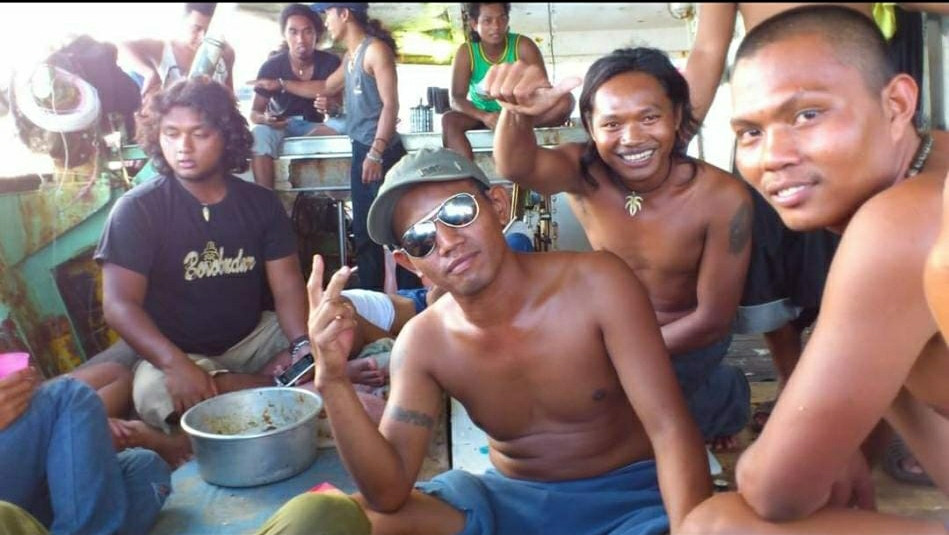Popular Reads
Top Results
Can't find what you're looking for?
View all search resultsPopular Reads
Top Results
Can't find what you're looking for?
View all search resultsSlavery to advocacy: How one fisherman is fighting abuse at sea
Beaten and stranded at sea, Imam Syafi survived and now leads a movement to reform an industry rife with exploitation.
Change text size
Gift Premium Articles
to Anyone
"Welcome to the hell ship.”
That was how a man welcomed Imam Syafi'i and his fellow fishermen aboard the dilapidated fishing boat that was to be their workplace for the next few months in 2011. The vessel, berthed at a harbor in Trinidad and Tobago, could support 35 tons, but its appearance made Imam wary.
The fishermen were mainly targeting albacore but were also in search of marlin and yellowfin tuna, as well as whatever other commercial fish happened to get caught in their nets. Imam had signed a contract two work on the ship for two years.
The man who greeted them was Indonesian, like Imam. He was one of the dozen or so crew members aboard the vessel, which could hold a maximum of 20 people. The crew included two Vietnamese and five Chinese fishermen. Imam and the man who gave him the ominous welcome were the only two Indonesians on board.
"I was confused when he said that. What was his point?" said the 35-year-old man. "[Then] I heard that there were no days off.”
Quickly enough, as the vessel set out into the Caribbean Sea, Imam learned that the problem went beyond the working hours.
Hell at sea
Beyond the 18-hour workday with no days off, the crew were beaten if they did anything “wrong”, which mostly meant misunderstanding the instructions given by the skipper, who only spoke in his native Chinese. Like most of the other non-Chinese crew members, Imam resorted to gestures to communicate, although that didn’t help much.
While there was only one skipper and many crew members, Imam said they never fought back because somehow they felt as if their mistakes warranted the beatings. The skipper would not beat the Chinese crew but would still yell at and antagonize them, recalled Imam.
He and the rest of the crew ate the same food every day: porridge in the morning and plain rice with some sparse vegetables for lunch and dinner. On rare days, chicken would be part of the meal. The crew were forbidden to eat fried food as the cooking oil was reserved for the skipper.
"Sometimes when we really, really wanted to eat fried food, we waited for the skipper's leftovers," he said.
The ship was a “trap” for Imam, with nowhere to go and almost no way to signal to the outside world. The only way to communicate with anyone on shore was by using the skipper's satellite telephone. Imam, like many other crew members, never used this option as the skipper would cut the cost from their salaries, which for Imam was around Rp 2.6 million (US$180) per month.
False hope
After a little over 12 months of fishing around the Caribbean, the skipper told the crew it was time to go back to Trinidad and Tobago. Imam and his fellow crew members breathed a sigh of relief.
But about a mile from Trinidad and Tobago's capital of Port of Spain, the boat dropped anchor. The ship lined up side by side with 20 other fishing boats owned by two companies.
The skipper told the other crew members that he and the Chinese crew would leave the ship first. They jumped aboard another ship, which was to take them to land. He told the rest of the crew that there was enough food and diesel fuel to power the generator for three months and promised that they would be picked up by another ship within a month and be paid. The crew believed him.
Imam soon discovered that there were also crew members left on the 20 other fishing ships.
After two months, no one had come to the boat. Finally, the stranded fishermen ran out of food and fuel. Imam thought of the hundreds of crew members abandoned on the other ships.
He and his friends sought help from local fishermen who passed their boats. No one was willing to assist. Finally, after paying a local fisherman with fishing equipment, some of the stranded crew members were brought to Port of Spain.
After reaching the capital, they did not know what to do. Imam took a rest and considered his options in a city park. Out of nowhere, an American who was born in Trinidad and Tobago said hello and asked Imam why he looked so despondent. Imam told him what he and his friends had been through.
The man offered him a job at his glass workshop, and Imam agreed. Some of the other crew members took jobs at local kebab stalls or the city’s shipyard. They all worked without permits to buy food for the more than a hundred crew members still stranded at sea. Some went back to the ship about once a week to bring food to their fellow fishermen.
Soon local law enforcement took notice of Imam and his fellow fishermen and began arresting them. Imam and his friends told the police the harsh conditions they had been through. Soon they became a big local news story, and their photos appeared in newspapers and magazines. This caught the attention of the Indonesian government, which gradually repatriated them in 2013. Still, all the crew went home without a penny for their hard work.
Advocating for justice
In Indonesia, Imam and his friends filed a lawsuit against the recruitment company.
He and 55 fellow crew members also founded the Solidarity Forum for Indonesian Workers Abroad (FSPILN) and staged protests in their hometowns, including Pemalang and Tegal, to encourage local administrations to take action against companies that recruited crew members there. They also occupied the Indonesian Migrant Worker Protection Agency (BP2MI, previously BNP2TKI) building for 23 days.
Fighting for human rights: Imam Syafi'i (center, with sunglasses) marches with other fishermen at a May Day rally in 2018. (JP/Courtesy of Imam Syafi'i)Having led many of these initiatives, Imam became popular among the crew members. Many of them consulted with him on their respective legal cases.
"As I was helping with other cases, I was struggling to finish my own case," he said.
In 2014, Imam and his 55 colleagues won their lawsuits in the West Jakarta District Court. They received Rp 1.1 billion in restitution, and the court sentenced the director of the recruitment company to a year in prison.
The group did not stop there. They also sought to have the Constitutional Court revise certain regulations governing migrant workers through a variety of means, including by taking the recruitment company to the high court, although these efforts were not successful.
In 2020, Imam established the Indonesian Transportation Crew Union (SAKTI) before founding another organization called the Association of Indonesian Fisheries Workers Unions (APPI) on May 1 of this year.
Imam's experience organizing labor unions has brought him some unexpected attention.
"Sometimes, I get confused. For example, I did not graduate from high school, but the University of Indonesia had invited me twice to share knowledge about organizing unions," he said.
Working class hero
Imam was an inspiration for Rahmatullah, a 26-year-old who lives in Tangerang. Like Imam, he had a harrowing experience working on a fishing boat off the coast of Somalia in early 2017. The company also defrauded him, paying a lower salary than agreed upon in the contract. His case is now being handled by the police.
Many other Indonesians have worked as crew members abroad. According to BP2MI's records, in the 2011 to 2019 period, 30,864 Indonesians worked on ships overseas. According to Indonesia Ocean Justice Initiative's 2020 policy brief, a lack of jobs and the low pay of the ones that existed were the primary reasons for Indonesians to work aboard foreign vessels.
Unpaid salaries and slavery are common issues in the industry. The Foreign Ministry has recorded more than 1,451 cases of rights violations involving Indonesian crew in foreign-flagged boats, up from 2019’s figure of 1,095 cases.
Imam has not stopped his efforts to help fellow workers. He is now pursuing a senior high school equivalent diploma so he can enroll in the legal undergraduate program at a university in his hometown.
Imam’s experiences have transformed him. Now, he wishes defend people who have been subject to the same injustices he has.
“Maybe it’s because I don’t come from a wealthy family, [but] when I see my neighbors [going through hardships], I think, ‘I can help them,’” he said.
Aryo Bhawono provided additional reporting for this article.












